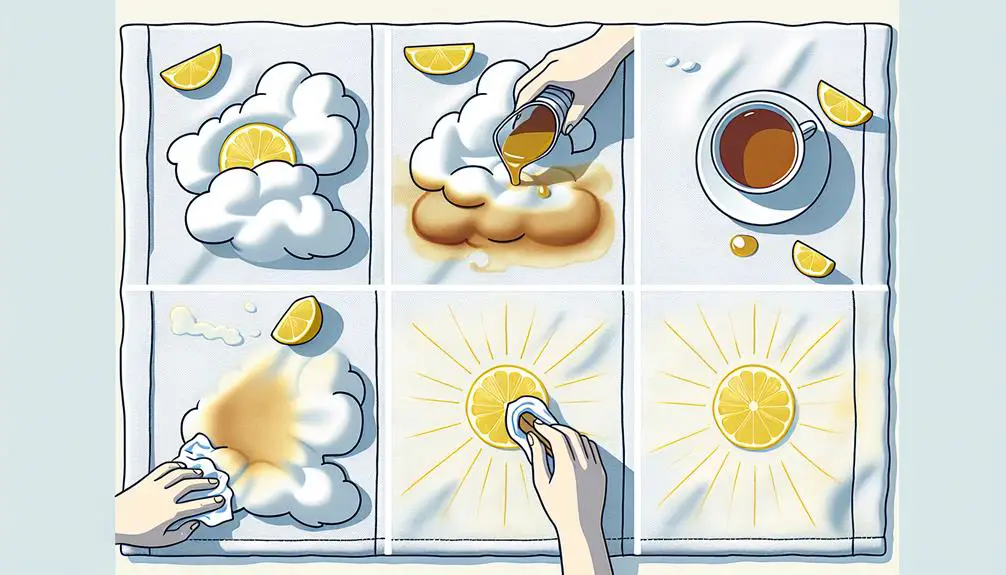Combat tea stains naturally with these methods: rinse with green tea, brush with baking soda paste, swish with apple cider vinegar, oil pull with coconut oil, brush with turmeric powder, snack on crunchy fruits/veggies, and scrub with activated charcoal. These options help prevent stains and maintain oral health.
Key Points
- Green tea rinses with polyphenols reduce plaque and combat bacterial growth.
- Baking soda paste acts as a mild abrasive to scrub away surface stains.
- Apple cider vinegar swish breaks down plaque, prevents accumulation, and brightens teeth.
- Coconut oil pulling reduces bacteria, prevents plaque, and contributes to fresher breath.
- Turmeric powder brushing removes surface stains, promotes gum health, and maintains oral hygiene.
Green Tea Rinses
To prevent tea stains on your teeth, consider incorporating green tea rinses into your oral hygiene routine. Green tea is known for its numerous health benefits, and when used as a mouth rinse, it can help combat staining effectively. Green tea contains polyphenols, which are natural antioxidants that can reduce plaque buildup and prevent teeth discoloration. These polyphenols also have anti-inflammatory properties, promoting gum health and preventing issues like gingivitis.
Using green tea as a mouth rinse is one of the best natural mouthwash alternatives available. It can freshen your breath while also providing protection against bacteria that cause bad breath and plaque formation. The catechins in green tea can inhibit the growth of bacteria in the mouth, reducing the chances of developing cavities and gum disease. Incorporating green tea rinses into your daily routine can be a simple yet effective way to maintain good oral hygiene and prevent tea stains on your teeth.
Baking Soda Paste
To combat tea stains on your teeth, consider using a baking soda paste. This simple mixture can help scrub away surface stains effectively.
Brush with the baking soda paste and then rinse thoroughly with water for a natural way to maintain a brighter smile.
Brush With Baking Soda
Using a baking soda paste to brush your teeth can effectively help prevent tea stains from discoloring your teeth. Baking soda benefits your oral health by acting as a mild abrasive that can gently scrub away surface stains caused by tea consumption. Its natural whitening properties make it a popular ingredient in many commercial teeth whitening products.
To utilize this method, mix a small amount of baking soda with water to form a paste, and brush your teeth with it for about two minutes. Make sure you don't brush too vigorously to avoid damaging your enamel. Baking soda is a cost-effective and natural way to maintain your teeth's brightness and combat the effects of tea staining.
Rinse With Water
For best results, consider gently rinsing your mouth with water after brushing with the baking soda paste to help remove any remaining residue and maintain a fresh feeling in your mouth. This simple step can aid in washing away any excess baking soda and tea stains, leaving your teeth feeling clean and refreshed.
Additionally, incorporating a fluoride mouthwash after rinsing can further protect your teeth against decay and strengthen enamel. Mouthwash benefits include reaching areas that brushing might miss, killing harmful bacteria, and freshening breath. The importance of fluoride in maintaining dental health can't be overstated, as it helps prevent cavities and promotes remineralization of enamel.
Apple Cider Vinegar Swish
Consider integrating apple cider vinegar swishing into your oral care routine to help prevent tea stains on your teeth. Apple cider vinegar is lauded for its oral health benefits, including its antibacterial properties that can help combat bacteria in the mouth. The acidity of apple cider vinegar is believed to break down plaque and prevent it from accumulating, which in turn can assist in reducing tea stains on teeth.
When swishing with apple cider vinegar, make sure to dilute it with water to prevent potential enamel erosion due to its acidic nature. Swish the diluted solution around in your mouth for about 30 seconds to 1 minute, then rinse your mouth with plain water. The vinegar effectiveness in removing stains is attributed to its ability to break down surface stains and brighten the teeth naturally. However, it's important to use this method sparingly to avoid any adverse effects on your tooth enamel.
Coconut Oil Pulling
To further enhance your oral health regimen and combat tea stains, you can explore the benefits of coconut oil pulling. Coconut oil pulling is a traditional technique that involves swishing coconut oil in your mouth to improve oral hygiene.
Here are some key points to ponder:
- Oil Pulling Benefits:
- Reduces harmful bacteria in the mouth.
- Helps prevent plaque buildup.
- May contribute to fresher breath.
- Drawbacks of Oil Pulling:
- Time-consuming as it's recommended to swish for 15-20 minutes.
- Some people may find the texture of coconut oil unpleasant at first.
- Not a substitute for regular brushing and flossing.
When engaging in coconut oil pulling, take a tablespoon of coconut oil, swish it around your mouth, and then spit it out. Remember not to swallow the oil as it contains the bacteria and toxins you're trying to remove. Include this practice in your routine for potential improvements in oral health and a brighter smile.
Turmeric Powder Brush
If you're looking to brighten your smile and combat tea stains naturally, consider incorporating turmeric powder brushing into your oral care routine. Turmeric, a staple in Ayurvedic remedies, is known for its natural ingredients that promote oral health through a holistic approach. This yellow spice contains curcumin, a compound with anti-inflammatory and antimicrobial properties, making it beneficial for gum health and overall oral hygiene.
To create a turmeric powder brush, mix a small amount of turmeric powder with water to form a paste. Gently brush your teeth with this paste for about two minutes, then rinse thoroughly. Be cautious as turmeric can stain clothes and surfaces, but it can effectively combat tea stains on teeth due to its mildly abrasive nature that helps remove surface stains without being too harsh on enamel.
Incorporating turmeric powder brushing into your routine a few times a week can aid in maintaining a bright and healthy smile while embracing the benefits of Ayurvedic remedies and natural ingredients for your oral care needs.
Crunchy Fruits and Veggies
When it comes to preventing tea stains on your teeth, incorporating crunchy fruits and veggies into your diet can be highly beneficial.
Not only do these snacks provide a natural way to increase saliva production, but their crisp texture can help scrub away surface stains.
Eat Crunchy Snacks
Incorporate crunchy fruits and veggies into your daily diet to help prevent tea stains on your teeth. These tooth-friendly snacks not only promote oral health but also act as natural teeth cleaners. Here are some crunchy alternatives to contemplate:
- Crisp apples: The natural abrasiveness of apples helps scrub away tea stains on your teeth.
- Raw carrots: Chewing on raw carrots increases saliva production, which washes away staining compounds.
- Celery sticks: Celery's fibrous texture stimulates saliva production while cleaning your teeth.
Including these crunchy snacks in your daily routine can assist in keeping your teeth looking bright and stain-free.
Increase Saliva Production
Boost your saliva production naturally by enjoying crunchy fruits and veggies, such as crisp apples, raw carrots, and celery sticks. Chewing these foods stimulates saliva flow, which helps wash away food particles and prevent tea stains on your teeth.
Additionally, citrus fruits like oranges and lemons can also give your saliva production a boost due to their acidic nature. The act of chewing gum can also increase saliva production, aiding in keeping your teeth clean and bright.
Incorporating these habits into your daily routine can contribute to maintaining good oral hygiene and reducing the likelihood of tea stains tarnishing your smile. Remember, a healthy mouth starts with simple yet effective practices like increasing saliva production with crunchy snacks and citrus fruits.
Activated Charcoal Scrub
To help prevent tea stains on your teeth, consider using an activated charcoal scrub as a natural method. Activated charcoal is known for its ability to attract and remove stains, toxins, and bacteria from the teeth's surface, helping to keep your smile bright and stain-free.
Here are some key points to keep in mind when using an activated charcoal scrub:
- Gentle Abrasive Action: The fine granules of activated charcoal in the scrub work gently to polish away surface stains without causing any damage to the enamel.
- Absorption Properties: Activated charcoal's porous nature allows it to absorb impurities and pigments, making it effective in removing stains caused by tea consumption.
- Natural Whitening: Regular use of an activated charcoal scrub can help maintain a naturally white smile by preventing the buildup of tea stains on the teeth.
Incorporating an activated charcoal scrub into your oral care routine can be a beneficial addition to prevent tea stains and keep your teeth looking their best.
Frequently Asked Questions
Can These Natural Methods Be Used in Combination With Regular Dental Cleanings at the Dentist?
Yes, these natural methods can complement regular dental cleanings. While dental check-ups guarantee thorough cleaning, home remedies like oil pulling or baking soda can aid in natural prevention. Combining both approaches can help maintain a healthy smile.
Are There Any Side Effects or Risks Associated With Using These Natural Methods to Prevent Tea Stains on Teeth?
Using natural methods to prevent tea stains on teeth may have potential risks. Allergic reactions to ingredients like baking soda or lemon can occur. Speak with your dentist before trying these remedies to guarantee safety.
How Often Should These Natural Methods Be Used in Order to See Results in Preventing Tea Stains on Teeth?
To maintain a tea-stain-free smile, use natural methods consistently. Regular use guarantees long-term effectiveness in preventing stains. Make it part of your daily routine for best results. Keep up the good work!
Are There Any Specific Types of Green Tea or Apple Cider Vinegar That Work Best for Preventing Tea Stains on Teeth?
When it comes to types of green tea, look for high-quality brands like Matcha or Sencha for best results in preventing tea stains on teeth. Apple cider vinegar offers natural remedies, boasting benefits for teeth.
Can These Natural Methods Also Help to Prevent Other Types of Stains on Teeth, Such as Coffee or Wine Stains?
When it comes to preventing coffee and wine stains on your teeth, herbal remedies and whitening toothpaste can be effective allies. Incorporate these natural solutions into your routine for a brighter, stain-free smile.



